Three Ways Lean Lab Projects Create an Empowered Workforce And Why That’s Important
In 2011, Seibert et al. conducted a meta-analytic review of the effects of empowerment in organizations1. They determined that employee empowerment was associated with numerous positive outcomes including job satisfaction, job performance, and commitment to the organization1. Additionally, they found that team empowerment was positively related to performance1. By engaging in Lean lab projects and empowering their workforce, companies create a culture of accountability, engagement, motivation, and collaboration.
Pharmaceutical companies are increasingly acknowledging that Lean and continuous improvement are applicable outside of the manufacturing space. Lean provides both the management and philosophical basis for pursuing and supporting quality through the design of systems that foster right-first-time. When quality is embedded in the organization’s culture, it increases efficiency and productivity, as well as creating outputs that are stable and expected. According to Lean systems, the customer is the priority; in some lab spaces, the customer may be other testing labs or manufacturers while in others, the customer may be supply chain or quality assurance. By recognizing the customer as priority and developing people as the most important resource in achieving higher quality, a culture of respected, empowered, and accountable employees can be created.
BSM use the core tenets of Lean, mentioned above, during each Lean Lab project as well as the Real Lean concepts of levelling, flow, and standard work. Throughout each project, a team of analysts and support personnel is created and they are heavily involved in the development and standardization of lean laboratory processes. During the project, the team is trained in many aspects of Lean from data analysis to continuous improvement. By involving the analysts and technicians who are ultimately the personnel affected by the changes in the lab processes, a sense of ownership and accountability are created.
Often when discussing the benefits of Lean lab projects, the typical increases in on-time delivery, capacity, productivity, and quality are highlighted while the benefits to the analysts are omitted. There are three key ways that lab personnel are empowered by a Lean lab project:
- Through their intimate involvement in the design of the Lean Lab process analysts develop a deep understanding of the solution and as such are well placed to spot when the system needs to be tweaked and updated.
- During the Lean Lab project, analysts use their experiences to combine work into productive roles leading to the democratization of non-test tasks, huddles & the problem solving that can take place at them. Using visual management systems and metrics, the lab workload is visible to both the analysts and their supervisors.
- Through the continuous improvement cycle, analysts are involved in making decisions that improve the lab.
In a Lean culture, quality is based on the pillars of respect for and development of people who are responsible for the continuous improvement. Throughout the Lean lab design process, good ‘time and task managers’ and subject matter experts are leveraged to create standard work for the lab’s processes and design standard roles that make effective use of resources while balancing daily and weekly workloads. By levelling the workload and determining standard roles, analysts are empowered to oversee their own role assignments, leading to a more accountable workforce. Finally, by ensuring metrics are outlined and tracked in a manner that is easily observed and interpreted allows analysts to engage in continuous improvement projects and improve the culture and performance of the lab.
There are several major benefits of employee engagement, six are elaborated upon below.
By engaging in Lean Lab projects, employers directly invest in their employees creating a culture of analyst empowerment, investment, and engagement which leads to positive outcomes for the company as a whole.
- Seibert, S. E., Wang, G., & Courtright, S. H. (2011). Antecedents and consequences of psychological and team empowerment in organizations: A meta-analytic review. Journal of Applied Psychology, 96(5), 981–1003. https://doi.org/10.1037/a0022676 .
- McFeely, S. and Wiger, B. (2019). This Fixable Problem Costs U.S. Businesses $1 Trillion. https://www.gallup.com/workplace/247391/fixable-problem-costs-businesse…
- Dagbo, J. and Acuna, S. (2020). Company Culture: Private Equity’s Intangible Value Creation Lever. https://www.gallup.com/workplace/316883/company-culture-private-equity-…
Our consultants can provide further information on the above and discuss any aspect of Real Lean Transformation, simply set-up a call today.

